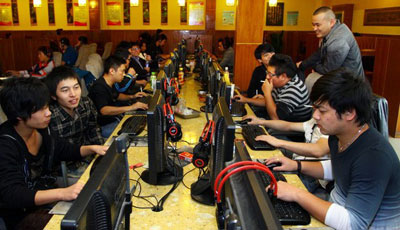By Rachel Vandenbrink, Radio Free Asia
Amid a global decline in Internet freedom, activists are increasingly pushing back against repressive Web controls, according to a new study released Thursday that highlighted deteriorating trends in China and Vietnam, Asia’s worst online oppressors.
Netizens at an Internet cafe in China’s Zhejiang province, Nov. 2, 2012.

Citizen activism online has seen a “significant uptick” worldwide over the past year as activists become more effective at raising awareness of emerging threats and forestalling repressive measures, U.S.-based watchdog Freedom House said in its annual “Freedom on the Net” survey.
In nearly a dozen countries, “negative” laws were deterred as a result of civic mobilization and pressure by activists, lawyers, the business sector, reform-minded politicians, and the international community, the study showed.
In a few countries, it said, civic activists were able to form coalitions and proactively lobby governments to pass laws that protect Internet freedom or amend previously restrictive legislation.
But at the same time, broad surveillance measures, new laws controlling web content, and more arrests of social media users have driven a worldwide decline in Internet freedom, it warned.
“While blocking and filtering remain the preferred methods of censorship in many countries, governments are increasingly looking at who is saying what online, and finding ways to punish them,” the project’s director Sanja Kelly said.
The report, which identifies key trends in 60 countries, evaluated each nation based on barriers to access, limits on content, and violations of user rights.
In Asia, Vietnam and China suffered further downgrades in the survey compared to their 2012 scores, while Myanmar, on the back of reforms being implemented by reformist president Thein Sein, saw the highest jump out of all the countries examined.
The report warned of a “worsening cycle of repression” in Vietnam, where authorities have introduced new restrictive measures and the number of bloggers detained for posting content critical of the government has increased “dramatically” over the past two years.
China ‘leading the way’
China, along with Cuba and Iran, received some of the lowest scores for the second year in a row in the survey, which does not include North Korea, noted for its repressive measures on freedom as a whole.
“As in previous years, China led the way in expanding and adapting elaborate technological apparatus for systemic Internet censorship, while further increasing offline arrests,” the report said.
China has been particularly successful in harnessing the private sector to further its censorship goals, with private companies hiring whole divisions to monitor and delete millions of online comments each year, it said.
Under the most elaborate system of Internet content control in the world, Tibetans and Uyghurs are “particularly vulnerable” to surveillance and prosecution, it said.
Read the full story by Rachel Vandenbrink from Radio Free Asia.

